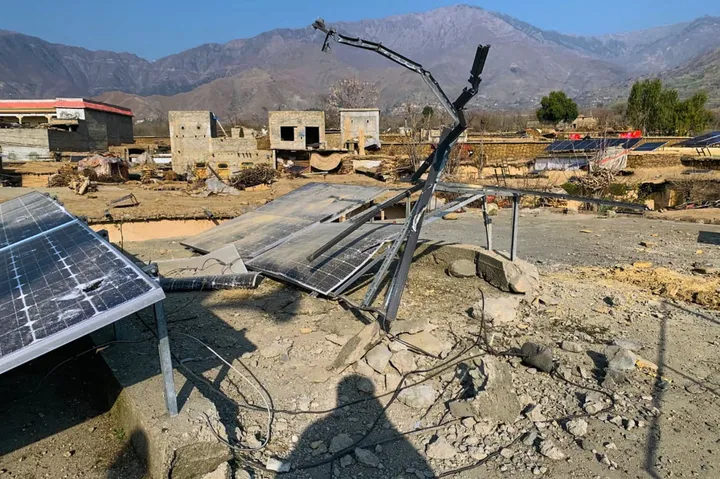Rahul Gandhi, the president of India's leading opposition party Congress, recently filed his nomination for the upcoming general election from Wayanad, a remote district in south India's Kerala state. He followed it up with an energetic and well-attended roadshow of the kind the sleepy town has not seen in a long time.
This is the first time that Gandhi will step out of his family pocket borough of Amethi in Uttar Pradesh (UP) for an electoral contest since he fought his first election from there 15 years ago. Gandhi isn’t abandoning his current seat though. He’ll be contesting from two seats, repeating a feat that few national leaders have resorted to in the past.
In 2014, Narendra Modi had contested from Varanasi in UP, India’s most populated and politically influential state, resulting in windfall gains for his party -- the Bharatiya Janata Party (BJP) -- there.
The BJP won 71 of the 80 parliamentary constituencies in UP, cruising past the halfway mark of 272 in the lower house of parliament with an absolute majority -- the first for any party in three decades, since Gandhi’s father Rajiv, returned as prime minister in 1984. BJP's spike caused the Congress's seat share to plummet from 206 five years ago, to a mere 44.
The Congress under Gandhi may not be predicted to sweep the election the way the BJP under Modi did in 2014, but he is surely eyeing big gains and following his predecessors in one respect: when in deep trouble, the Nehru-Gandhi clan that gave the country three prime ministers has often turned to South India seeking voter validation.
Indira Gandhi, after losing the 1977 election that followed the general Emergency she had imposed on the country, assuming unbridled powers as the prime minister, contested a bypoll from Chikmagalur in November 1978 and entered parliament as a forceful opposition voice.
In the Congress stronghold in the southern Indian state of Karnataka nearly half of its voters were from minorities or the backward castes and Indira managed to defeat the ruling Janata Party candidate by over 70,000 votes. “There was a clear north-south divide during the Emergency. While Indira Gandhi could not even retain her seat in Uttar Pradesh, the south was still voting for the Congress,” said former Jawaharlal Nehru University professor and historian, Mridula Mukherjee.
Being in parliament allowed Indira Gandhi to travel to London on a diplomatic passport (her original passport was seized under the cases registered against her for the Emergency) and she got down to “repairing her international image from London”, wrote her biographer Katherine Frank. Indira was expelled from parliament and jailed for a week in December but by then she had used the opportunity to stem the anti-Emergency sentiment against her. The sympathy created by her arrest helped the Congress to bounce back. In the next election, the party went from 189 seats in the previous election to cross the two-thirds majority mark.
In the 1980 election, she fought from her previous constituency Rae Bareli and Medak in Andhra Pradesh (now in Telangana after the state was split to create two in 2014). While she won both seats, Indira stepped down from Rae Bareli and remained the Medak legislator to the day she was assassinated on October 31, 1984.
Years later, on May 21, 1991, her son Rajiv Gandhi, who had followed her as prime minister, was assassinated while campaigning for the election in Tamil Nadu’s Sriperumbudur. No one from the family contested an election for a few years after that.
One year after becoming Congress president in 1999, Sonia Gandhi contested from Bellary in Karnataka. Not only did she win but she did so by defeating the more politically experienced BJP leader (and current Foreign Minister Sushma Swaraj). “Swaraj went from door to door and tried very hard [to defeat Sonia Gandhi]. But Congress has deep roots in the society in Southern India,” said Rasheed Kidwai, Sonia Gandhi's biographer.
She went on to be the longest serving Congress president in history. “The win consolidated Sonia Gandhi's position within the party and helped clear the confusion about the Congress among the voters,” Kidwai explained. Before she contested the election, Gandhi had offered to resign as party president owing to opposition from within based on her not being Indian-born. The win quelled all discordant voices and she stayed president until December 2017, finally making way for Rahul Gandhi.
Rahul's similar southern foray is a strong counter to Modi's expansionist plans and the BJP's dominance of North India. The BJP has an abysmal presence in the south, with less than 20 of the 130 seats there. Congress is seeking to gain by pitching Gandhi from a southern seat in the long run. Wayanad in North Kerala abuts Tamil Nadu on one side and Karnataka on the other. Congress strategists expect the election to have a ripple effect on the neighbouring states. While the party is in power in Karnataka in a coalition, it has forged an alliance in Tamil Nadu as well.
The party is eyeing gains in the south in most states except Telangana. Both Kidwai and Mukherjee predict the move will help the Congress not just in this election but in the longer run. The BJP has an aggressive southern plan but has not been able to win a significant number of seats outside Karnataka. The Congress's focus on the south could arrest the pace of BJP's expansion there. “National politicians from the north need to demonstrate a real connect on the ground with voters in the south. Contesting an election is the best way to send out that message,” Mukherjee said.
While the BJP has started publicising the decision as Gandhi’s betrayal of Amethi, the Congress retains the edge in the family pocket borough. Even with the Modi wave rising high in 2014, Gandhi held onto the seat defeating his opponent and BJP minister comfortably.























